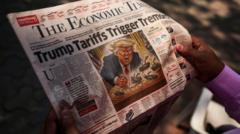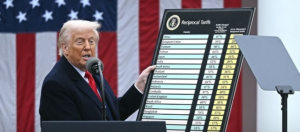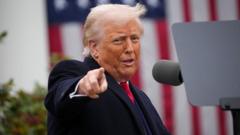British voters are still grappling with the repercussions of Brexit, raising concerns about a similar trajectory in the U.S.
Brexit's Lessons: Parallels to Trump's Tariff Decisions

Brexit's Lessons: Parallels to Trump's Tariff Decisions
An analysis of how Brexit's economic consequences mirror President Trump's tariff policies.
Britain has observed President Trump’s tariffs with a blend of surprise, intrigue, and a troubling sense of familiarity. The nation embarked on its own journey of economic isolation when it voted to leave the European Union in 2016, and nearly nine years post-referendum, it continues to confront the ramifications. The insights gained from Brexit are now particularly relevant as Trump adopts a comparable strategy of tightening U.S. economic borders.
Critics previously labeled Brexit as one of the most damaging acts of economic self-damage by a Western nation since World War II. This sentiment might soon extend across the Atlantic. Trump's recent unexpected withdrawal from certain tariffs amidst a bond-market crisis recalled events from Britain, where Liz Truss’s brief premiership came to an end after her radical tax cuts unnerved markets. Her missteps illustrated the extreme policies triggered by the UK’s decision to leave the EU.
Mark Malloch Brown, a British diplomat and former UN deputy secretary-general, indicated, “In a way, some of the worst legacies of Brexit are still ahead.” He insightfully noted the challenging crossroads Britain faces: whether to strengthen trade connections with Europe or to maintain allegiance to Trump's America.
“The fundamental issue remains the rupture with our largest trading partner,” Malloch Brown pointed out, suggesting that if the U.K. ultimately gravitates towards a closer relationship with Europe to avoid further friction with the U.S., it would represent “only half a victory.”






















